UITableView与UITableViewCell
转自:http://blog.sina.com.cn/s/blog_4cd14afb01014j97.html
UITableView用来以表格的形式显示数据。关于UITableView,我们应该注意:
(1)UITableView用来显示表格的可见部分,UITableViewCell用来显示表格的一行。
(2)UITableView并不负责存储表格中的数据,而是仅仅存储足够的数据使得可以画出当前可见部分。
(3)UITableView从UITableViewDelegate协议获取配置信息,从UITableViewDataSource协议获得数据信息。
(4)所有的UITableView实现时实际上只有一列,但是我们可以通过向UITableViewCell中添加子视图,使得它看起来有好几列。
(5)UITableView有两种风格:
① Grouped:每一组看起来像是圆矩形;
② Plain:这是默认风格,可以修改成Indexed风格。
在下边的小例子中,我们将先实现显示一列数据,然后在每行添加图像,之后再看看UITableViewCell的四种分别是什么样的。最后再进行其他操作,比如设置缩进、修改字体大小和行高等。
1、运行Xcode 4.2,新建一个Single View Application,名称为Table Sample:
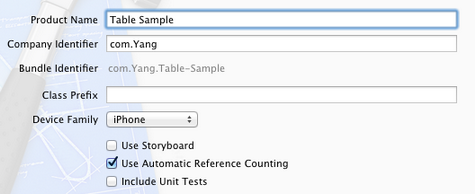
2、单击ViewController.xib,使用Interface Builder给视图添加一个UITableView控件,并使其覆盖整个视图:

3、选中新添加的UITableView控件,打开Connection Inspector,找到delegate和datasource,从它们右边的圆圈拉线到File's Owner图标:

4、单击ViewController.h,在其中添加代码:
#import <UIKit/UIKit.h> @interface ViewController : UIViewController<UITableViewDelegate, UITableViewDataSource> @property (strong, nonatomic) NSArray *listData; @end
5、单击ViewController.m,在其中添加代码:
5.1 在@implementation后面添加代码:
@synthesize listData;
5.2 在viewDidLoad方法中添加代码:
- (void)viewDidLoad { [super viewDidLoad]; // Do any additional setup after loading the view, typically from a nib. NSArray *array = [[NSArray alloc] initWithObjects:@"Tree", @"Flower", @"Grass", @"Fence", @"House", @"Table", @"Chair", @"Book", @"Swing" , nil]; self.listData = array; }
5.3 在viewDidUnload方法中添加代码:
- (void)viewDidUnload { [super viewDidUnload]; // Release any retained subviews of the main view. // e.g. self.myOutlet = nil; self.listData = nil; }
5.4 在@end之前添加代码:
#pragma mark - #pragma mark Table View Data Source Methods //返回行数 - (NSInteger)tableView:(UITableView *)tableView numberOfRowsInSection:(NSInteger)section { return [self.listData count]; } //新建某一行并返回 - (UITableViewCell *)tableView:(UITableView *)tableView cellForRowAtIndexPath:(NSIndexPath *)indexPath { static NSString *TableSampleIdentifier = @"TableSampleIdentifier"; UITableViewCell *cell = [tableView dequeueReusableCellWithIdentifier: TableSampleIdentifier]; if (cell == nil) { cell = [[UITableViewCell alloc] initWithStyle:UITableViewCellStyleDefault reuseIdentifier:TableSampleIdentifier]; } NSUInteger row = [indexPath row]; cell.textLabel.text = [listData objectAtIndex:row]; return cell; }
上面的第二个方法中,
UITableViewCell *cell = [tableView dequeueReusableCellWithIdentifier: TableSampleIdentifier];
这个语句根据标识符TableSampleIdentifier寻找当前可以重用的UITableViewCell。当某行滑出当前可见区域后,我们重用它所对应的UITableViewCell对象,那么就可以节省内存和时间。
如果执行词语后,cell为nil,那我们再创建一个,并设置去标识符为TableSampleIdentifier:
cell = [[UITableViewCell alloc] initWithStyle:UITableViewCellStyleDefault reuseIdentifier:TableSampleIdentifier];
这里UITableViewCellStyleDefault是表示UITableViewCell风格的常数,除此之外,还有其他风格,后面将会用到。
注意参数(NSIndexPath *)indexPath,它将行号row和部分号section合并了,通过[indexPath row];获取行号。之后给cell设置其文本:
cell.textLabel.text = [listData objectAtIndex: row];
6、运行一下:
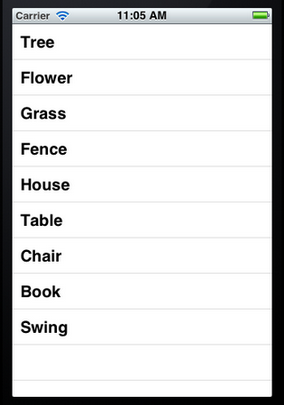
7、给每一行添加图片:
7.1 将图片资源添加到工程:拖到工程中,前面的文章有提到。
7.2 在cellForRowAtIndexPath方法的return语句之前添加代码:
UIImage *image = [UIImage imageNamed:@"blue.png"]; cell.imageView.image = image; UIImage *highLighedImage = [UIImage imageNamed:@"yellow.png"]; cell.imageView.highlighedImage = highLighedImage;
7.3 运行,效果如下:
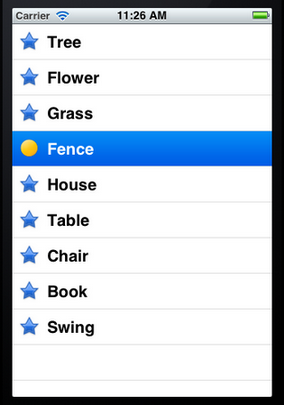
可以看到,每行左边都出现一张图片。当选中某行,其图片改变。
8、设置行的风格:
表示UITableViewCell风格的常量有:
UITableViewCellStyleDefault UITableViewCellStyleSubtile UITableViewCellStyleValue1 UITableViewCellStyleValue2
这几种风格的区别主要体现在Image、Text Label以及Detail Text Label。
为了体现风格,在cellForRowAtIndexPath方法的return语句之前添加代码:
cell.detailTextLabel.text = @"Detail Text";
然后将
cell = [[UITableViewCell alloc] initWithStyle:UITableViewCellStyleDefault reuseIdentifier:TableSampleIdentifier];
中的UITableViewCellStyleDefault依次换成上面提到的四个风格常量,并运行,效果分别如下:

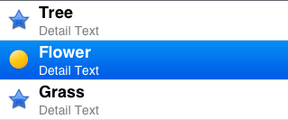
UITableViewCellStyleDefault UITableViewCellStyleSubtle
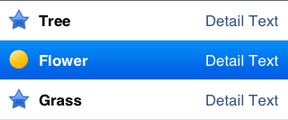

UITableViewCellStyleValue1 UITableViewCellStyleValue2
9、设置缩进:
将所有行的风格改回UITableViewCellStyleDefault,然后在@end之前添加代码如下:
#pragma mark Table Delegate Methods - (NSInteger)tableView:(UITableView *)tableView indentationLevelForRowAtIndexPath:(NSIndexPath *)indexPath { NSUInteger row = [indexPath row]; return row; }
这里将第row行缩进row,如下图所示:
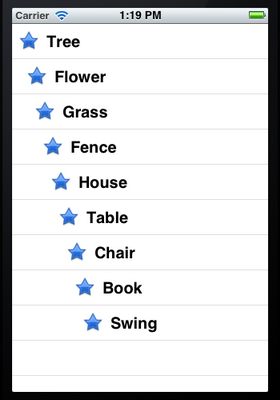
10、操纵行选择:
在@end之前添加代码:
- (NSIndexPath *)tableView:(UITableView *)tableView willSelectRowAtIndexPath:(NSIndexPath *)indexPath { NSUInteger row = [indexPath row]; if (row%2 == 0) { return nil; } return indexPath; }
上面的方法在选择某行之前执行,我们可以在这个方法中添加我们想要的操作。这里,我们实现的是,如果选择的行号(从0开始计)是偶数,则取消选择。
在@end之前添加代码:
- (void)tableView:(UITableView *)tableView didSelectRowAtIndexPath:(NSIndexPath *)indexPath { NSUInteger row = [indexPath row]; NSString *rowValue = [listData objectAtIndex:row]; NSString *message = [[NSString alloc] initWithFormat: @"You selected %@", rowValue]; UIAlertView *alert = [[UIAlertView alloc] initWithTitle:@"Row Selected!" message:message delegate:nil cancelButtonTitle:@"Yes I Did" otherButtonTitles:nil]; [alert show]; [tableView deselectRowAtIndexPath:indexPath animated:YES]; }
当选择某行之后,就弹出一个Alert,用来显示我们所做的选择。
运行一下,你会发现第0、2等行无法选择。选择奇数行时会弹出提示:

而且关闭提示框后,选择的那行也被取消了选择,用的语句
[tableView deselectRowAtIndexPath:indexPath animated:YES];
11、设置字体大小和表格行高:
11.1 在cellForRowAtIndexPath方法中的return之前添加代码,用于设置字体和大小:
cell.textLabel.font = [UIFont boldSystemFontOfSize:50];
11.2 在@end之前添加代码,用于设置行高:
- (CGFloat)tableView:(UITableView *)tableView heightForRowAtIndexPath:(NSIndexPath *)indexPath { return 70; }
运行,看看效果:

UITableView与UITableViewCell的更多相关文章
- UITableView和UITableViewCell的几种样式
UITableView和UITableViewCell的几种样式 转至 http://blog.csdn.net/crazyzhang1990/article/details/12503163 一. ...
- [OC] UITableView 与 UItableViewCell 的使用
UITableView //UIViewController里添加一个UITableView @interface ViewController : UIViewController<UITa ...
- iOS 初学UITableView、UITableViewCell、Xib
注意事项: 1.一个.xib里面最多设置一个cell 2.要仔细调整自动布局,其实它不太好用 3.记得设置<UITableViewDataSource>委托 4.记得在ViewContro ...
- UI第十八节——UITableView
在iOS开发中UITableView可以说是使用最广泛的控件,我们平时使用的软件中到处都可以看到它的影子,基本大部分应用都有UITableView.当然它的广泛使用自然离不开它强大的功能,今天就针对U ...
- iOS开发系列--UITableView全面解析
--UIKit之UITableView 概述 在iOS开发中UITableView可以说是使用最广泛的控件,我们平时使用的软件中到处都可以看到它的影子,类似于微信.QQ.新浪微博等软件基本上随处都是U ...
- UITableView或UIScrollVIew上的UIButton的高亮效果
UITableView或UIScrollVIew上的UIButton的高亮效果 原文地址:http://www.jianshu.com/p/b4331f06bd34 最近做项目的时候发现,UIScro ...
- 去掉UITableView多余的空白行分割线
一.问题描述 在学习和开发中经常会遇到下面的问题,UITableView的UITableViewCell很少或者没有时,但UITableView有很多的空白行分割线.如下图: 如何去掉UITableV ...
- UITableView全面解析
本文转自:http://www.cocoachina.com/ios/20140922/9710.html 在iOS开发中UITableView可以说是使用最广泛的控件,我们平时使用的软件中到处都可以 ...
- UITableView全面解析,讲的好详细
--UIKit之UITableView 概述 在iOS开发中UITableView可以说是使用最广泛的控件,我们平时使用的软件中到处都可以看到它的影子,类似于微信.QQ.新浪微博等软件基本上随处都是U ...
随机推荐
- Android8.1源码编译实践(Mac)
第0步:版本选择 AOSP版本选择很重要,如果选错了,会造成编译失败等各种问题,编译AOSP对Xcode的版本是有要求的: 比如:AOSP6.0-7.0,要求Xcode的版本是8.3,然而在MacOS ...
- python字符减运算
在C语言等高级语言中,字符之间的减运算都是支持的,但是python不然,在python中直接进行字符减运算是不被允许的. >>> print('c'-'a') Traceback ( ...
- python爬虫中文乱码问题(request方式爬取)
https://blog.csdn.net/guoxinian/article/details/83047746 req = requests.get(url)返回的是类对象 其包括的属性有: r ...
- Mysql—数据库管理与表管理
数据库管理 表管理 删除表
- Go命令行库Cobra的核心文件root.go
因为docker及Kubernetes都在用cobra库,所以记录一下. 自定义的地方,高红标出. root.go /* Copyright © 2019 NAME HERE <EMAIL AD ...
- 1. Go语言—初始
一.golang语言特性 1. 垃圾回收 内存自动回收,再也不需要开发人员管理内存 开发人员专注业务实现,降低了心智负担 只需要new分配内存,不需要释放 2. 天然并发 从语言层面支持并发,非常简单 ...
- JDOJ1100: Fix
题目大意 给你n个点,其中一些点是固定的,然后还有一些没有固定的,然后问你固定所有点所用的线段的最小长度是多少. 所谓固定,就是形如三角形的情况,就是两个固定的点向一个未固定的点连两条边,就能把未固定 ...
- selenium添加chrome配置项
selenium虽然强大,但也有不方便的地方,selenium每次启动浏览器都是一个全新的浏览器,并没有加载任何的配置,这样在爬取一些需要登陆才能看到的页面时就有些不太方便.但我们可以通过加载chro ...
- Pycharm软件更换pip默认安装源为国内安装源
1.为什么这么做? Python里的pip是官方自带的源,国内使用pip安装的时候十分缓慢,所以最好是更换成中国国内的源地址. 2.准备工作: 目前国内靠谱的 pip 镜像源有: 清华: https: ...
- luoguP2852 [USACO06DEC]Milk Patterns
题意 显然如果有一个子串出现过\(k\)次,那么它必定是一个至少长为k的后缀序的\(LCP\),求出所有相邻的长为\(k-1\)的\(height\)数组的最小值,在其中取最大值即可 code: #i ...
